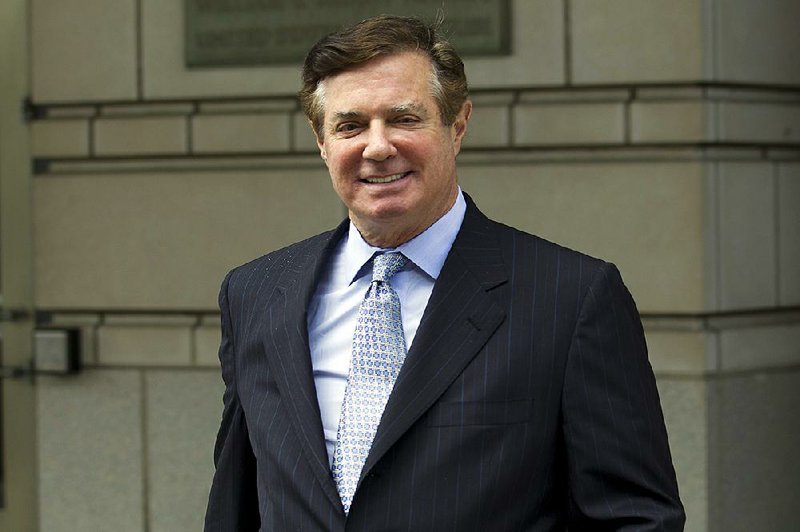WASHINGTON -- Paul Manafort shared 2016 presidential campaign polling data with Konstantin Kilimnik, a Russian associate whom the FBI has said has ties to Russian intelligence, according to a court filing.
The information is in a filing that appears to inadvertently include information not intended to be made public and indicates a pathway by which the Russians could have had access to Donald Trump's campaign data.
Manafort, a former Trump campaign chairman, on Tuesday denied in a filing from his defense team that he broke his plea deal by lying repeatedly to prosecutors working for special counsel Robert Mueller about that and other issues.
In his rebuttal to the special counsel's claims of dishonesty, Manafort exposed details of the dispute, much of which centers on his relationship with Kilimnik. The Russian citizen, who began working for Manafort's consulting firm starting in 2005, has been charged with helping his former boss to obstruct Mueller's investigation of Russian interference into the 2016 election. He is believed to be in Moscow.
The special counsel alleged that Manafort "lied about sharing polling data with Mr. Kilimnik related to the 2016 presidential campaign," according to the unredacted filing. The source of that data, including whether it came from the Trump campaign, is unclear.
According to the court filing, the special counsel also accused Manafort of lying about discussing a Ukrainian peace plan with Kilimnik during the 2016 campaign.
Manafort was in close contact with Kilimnik through the campaign, including meeting with him in the United States in May and again in August 2016.
Manafort's lawyers provided no additional details about the "Ukrainian peace plan."
In emails first reported by The Washington Post, Manafort, who was deeply in debt at the time he agreed to work for Trump's campaign for no pay, wrote to Kilimnik during the campaign and said he hoped to use his campaign role to "get whole." He also asked Kilimnik to offer private briefings about the campaign to Oleg Deripaska, a Russian businessman who is close to Putin and to whom Manafort owed money. A spokesman for Deripaska has said he was never offered or received briefings about the Trump campaign.
Kilimnik did not immediately respond to a request for comment Tuesday.
Mueller also said Manafort lied about contacting administration officials after Trump took office. Manafort had told investigators that he had no direct or indirect contact with White House officials since Trump's inauguration, but Manafort had been in touch with officials as recently as the spring, according to the special counsel.
Manafort told a colleague in February -- four months after he was indicted -- that he was in contact with a senior administration official through that time, prosecutors said. And in a text message, he authorized another person to speak with a White House official on May 26, they alleged.
In Tuesday's filing, Manafort's attorneys said that person was "asking permission to use Mr. Manafort's name as an introduction in the event the third-party met the President," which "does not constitute outreach by Mr. Manafort to the President."
They add that the other example of contact with administration officials "is hearsay purportedly offered by an undisclosed third party and the defense has not been provided with the statement."
In their submission to the court, Manafort's lawyers said his inconsistencies were honest mistakes.
Defense attorneys wrote that Manafort had trouble recollecting certain details in part because his solitary confinement at the Alexandria jail in Virginia have "taken a toll on his physical and mental health."
U.S. District Judge Amy Berman Jackson has ordered the special counsel to respond and set a Jan. 25 hearing date to air the competing perspectives.
Separately, an unidentified company owned by a foreign government is facing a court-imposed fine of $50,000 a day for refusing to comply with a grand jury subpoena that may be part of the special counsel's investigation.
The Supreme Court on Tuesday declined to block the subpoena, and the federal appeals court in Washington issued an opinion soon after that revealed the size of the fine, but little additional information about the company or the foreign government that owns it.
The company had sought to get the Supreme Court involved in the dispute, after lower courts had ruled against it. All the documents in the case were filed under seal, but the court's docket reflects the filings and the Supreme Court order.
A three-judge panel of the federal appeals court in Washington had in December upheld the issuance of the subpoena and a contempt order issued by a district judge when the company failed to comply. The panel's opinion Tuesday elaborated on its reasons for ruling against the company, rejecting its arguments that it was protected by a federal law that generally protects foreign governments from lawsuits in the United States.
Information for this article was contributed by Rachel Weiner, Spencer S. Hsu and Rosalind S. Helderman of The Washington Post; and by Mark Sherman of The Associated Press.
A Section on 01/09/2019
